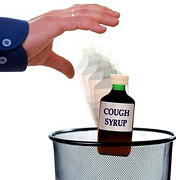 |
 |
|
|
Health Articles:
Alternative and General Health
Musculoskeletal Health
Nutrition and Herbs
Pediatric Health
Senior Health
Sports & Fitness
Women's Health
Ask A Doctor (Forum)
|
By Peter W. Crownfield Over-the-counter cough medicines enjoy massive popularity, but according to the experts, they're ineffective in treating the underlying causes of the common cough. So throw out those bottles of cough syrup and ask your doctor about natural alternatives. If you've ever taken medicated syrup or drops for an irritating cough and then waited, and waited, only to find that the cough seemed to resolve on its own time, this article is for you. Yes, that means virtually everyone, especially this time of year. Guidelines published in 2006 by the American College of Chest Physicians (ACCP) state that over-the-counter cough medications are ineffective in treating the underlying causes of cough. According to Dr. Richard Irwin, chair of the ACCP cough guidelines committee, over-the-counter cough syrups generally do not contain enough medicine to be effective, or they contain drugs that have not been proven to be effective for treating the common cough. "In most cases, a cough that is unrelated to chronic lung conditions, environmental influences, or other specific factors will resolve on its own," he said. The ACCP guidelines address cough in both the adult and pediatric populations. In fact, they strongly recommend against the use of over-the-counter cough and cold medications by children ages 14 and younger. "Cough is very common in children. However, cough and cold medications are not useful in children and can actually be harmful," said Dr. Irwin.
But wait, there's more: While cough expectorants and suppressants have little or no effectiveness in treating cough, they are potentially effective in causing cavities, suggests a 2006 report published in General Dentistry, the peer-reviewed journal of the American Academy of General Dentistry. The report revealed that many syrupy medications, including those commonly used for combating cough, are characterized by low pH levels, high acidity and sugar, which can cause erosion to the outer layers of the teeth. The report also noted that medicine administered before bedtime, when the flow of saliva decreases, can increase dental damage. |
